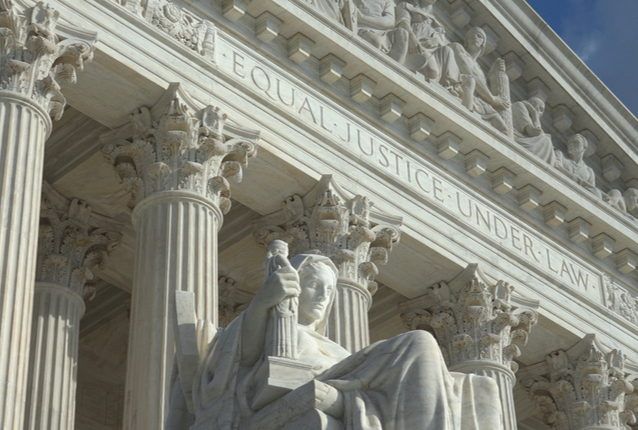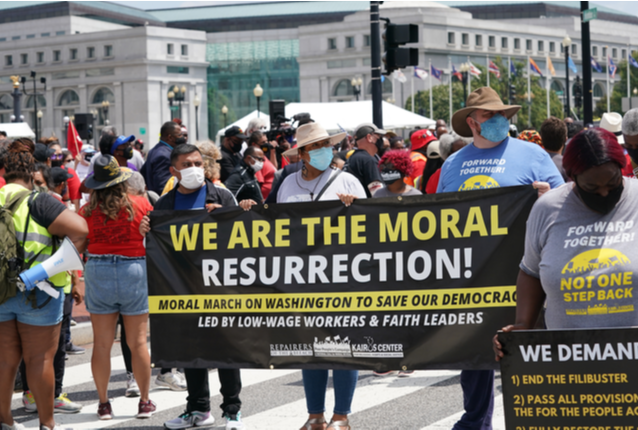It’s time to face facts. Whether it is in the workplace or at the ballot box, democracy is losing. Unions — once a cornerstone of economic democracy — are highly popular, but corporate greed and union busting have forced the percentage of people in labor unions to plummet. At the ballot box, the majority of people vote for the more progressive of our two parties, yet the right-wing party always wins. And now at the supreme court, a partisan majority can keep changing the rules of our democracy to keep the right-wing, the corporate wing, in power. With the passing of Justice Ruth Bader Ginsburg, our democracy could be lost forever.
The devastating thing is that the part of our democracy that is now most broken is the most ingenious part of the Framers’ design. The Framers gave federal judges life tenure to ensure beyond any doubt that judges can make decisions in individual cases free from political considerations. Unlike state judges who think “if I free this murder defendant, I may lose my seat at the next election,” federal judges know their position is more secure than any other job in the United States.
At the same time, however, the Framers gave the job of nominating federal judges to the political branches. The idea was, for better or for worse, that despite giving federal judges life tenure, the court would never stray too far from the general will for a significant period of time.
But today, the Supreme Court is about as far from the general will as it has ever been. And with RBG’s death, there is almost no sign of it turning back anytime soon without serious reform.
Democrats have won the popular vote all but one time beginning with the 1992 election. Almost all of the elections have been close by historical standards. Yet, Republican appointees have maintained a grip on the Supreme Court majority for the last fifty years. This mismatch between what the people have voted for and what the Supreme Court foisted on us was made clear in 2016 when, with nearly a year left in his presidency, Mitch McConnell and his allies in the Senate took away the prerogative of Barack Obama, twice elected by a majority of U.S. voters, to appoint a replacement of Antonin Scalia, all but guaranteeing another generation of right-wing rule on the Supreme Court.
The mismatch between the make-up of the Supreme Court and the general will is easy to spot. Nearly 9 in 10 U.S. residents believe that rich donors have too much influence over our elections. Yet in 2010, the Supreme Court decided in Citizens United v. FEC that trillion-dollar corporations have a constitutional right to try to buy our elections. Similarly, 70 percent of U.S. residents oppose gerrymandering, yet the Supreme Court has OK’d the practice of gerrymandering. One more example: Congress reauthorized the Voting Rights Act in 2006 with near unanimity in both houses, yet the Supreme Court gutted the Voting Rights Act, holding that its central feature was unconstitutional, leading to the mass disenfranchisement of Black voters that we see today — like in the 2018 race for Georgia Governor.
Each of these cases allows the right-wing to put their thumbs on the electoral scales, to continuously hold power. Before the enactment of Citizens United, the United States went from a right-wing president to the first Black president in our nation’s history. Congress went from Republican majorities in both Houses to our first woman speaker and the first filibuster-proof majority for Democrats in 30 years. Similar changes happened at the state level. But Citizens United completely reversed this trend — allowing Republicans and their corporate donors to flip the House, the Senate, and the White House back to conservative control.
Right-wingers, however, are not content to wield power for its own sake. They don’t want to gut our political democracy just to set up a political dictatorship. They keep their grasp on power in order to destroy our economic democracy as well.
When Mitch McConnell managed to pull off his blockade of President Obama’s nominee and a minority of U.S. voters were able to install Donald Trump as president. Then, when Trump was able to replace Antonin Scalia with another conservative, the stumbling block in the right-wing’s assault on labor unions was officially removed. The Republicans on the Court subsequently gutted unions’ ability to organize in the case of Janus v. AFSCME Council 31, deciding 5-4 against the labor unions.
Janus is not the only case in this vein. The Supreme Court has also taken aim at one of the few real moves toward economic democracy at the federal level — the creation of the Consumer Financial Protection Board. The CFPB provides an avenue for working people to hold the big banks who caused the 2008 financial crisis to account. In 2016, the CFPB helped expose the widespread fraud being committed by Wells Fargo. The Supreme Court responded by taking away the agency’s independence, thereby allowing a right-wing president to fire a CFPB director who investigates banks too diligently.
The fact is — our route to true political and economic democracy is constantly being blocked. With RBG gone, this block can continue to exist for decades to come.
The immediate action we need is to ensure that we vote out Trump, a president who lost the popular vote and has no democratic legitimacy to replace Justice Ginsburg. Long-term, however, we need to rethink a system that has gotten us into a place in which the legitimacy of our political democracy is in serious danger and our economic democracy is repeatedly undercut by right-wing forces. Voting Trump out of office alone won’t do the trick.



